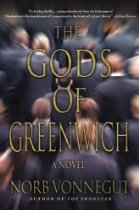The Gods of Greenwich by Norb Vonnegut
 Friday, March 18, 2011 at 8:16PM
Friday, March 18, 2011 at 8:16PM 
Published by Minotaur on April 26, 2011
Although I've enjoyed financial thrillers by Joseph Finder and Steven Gore (I haven't yet gotten to Stephen Frey or Christopher Reich), I approach them with some trepidation because for me, reading about finance is about as exciting as watching the Dow Jones ticker scrolling along the bottom of a television screen. As I began The Gods of Greenwich, however, those concerns vanished and never returned. The plot is smart and compelling, the characters are engaging, and Norb Vonnegut's writing style is energetic. This isn't a book that bogs down in the jargon of arbitrageurs and commodities brokers. Like a volatile market, the plot moves in unforeseen directions with unexpected speed.
Wealth, power, and crime are the key ingredients in a financial thriller. In The Gods of Greenwich, they are present in abundance. Norb Vonnegut creates credible characters from the financial world, both shady and relatively honest, while adding a ruthless female contract killer to the mix. The characters are strong, familiar without becoming stereotypical. Cy Leeser is the ultimate money managing jerk, complete with a trophy wife who isn't quite good enough, a 19,000-square-foot home that isn't quite big enough, a family that isn't quite large enough, a priceless art collection that isn't quite exclusive enough, and an oversize ego that's more than enough to make readers crave his downfall. Jimmy Cusack is a young hedge fund manager who is less successful than Leeser; the sluggish economy has caused his clients (including his father-in-law) to bail, forcing him to join Leeser's hedge fund team to save his condo from foreclosure. Jimmy's wife Emi suffers from a facial recognition disorder. Ólafur is a managing director at Hafnarbanki, Reykjavik's oldest bank, a rising star whose job depends upon thwarting Leeser's plan to drive down the value of the bank's stock. The contract killer is Rachel Whittier, an innovative murderer whose connection to the main story remains a mystery for much of the novel (as does the identity of her employer). Equally mysterious during the novel's first half is the role that will be played by Cusack's best friend, a trader dubbed "the Geek," who, like Ólafur, has ties to some powerful people in Qatar. Leeser's bodyguard, his head trader, and his feisty trophy wife (who is also a bestselling novelist from years past) round out the cast.
Leeser's fund makes money no matter how much the market falls. How he hedges the fund's investments -- his "secret sauce" -- is a mystery that provides the key not only to his success but to the novel's dramatic tension. (The hedge turns out to be ... creative. I'm not at all sure it would work outside of thriller world, but it's creative nonetheless.) The reader's sympathy rests with Cusack, who finds himself caught in the middle of a conflict he doesn't understand. Through much of the novel he's fretting about financial risk (he has money problems galore); it only dawns on him gradually that both he and his wife are facing a much greater risk, endangered by sources they can't identify for reasons they can't penetrate.
Greenwich, Connecticut is the epicenter of the hedge fund industry. Vonnegut demonstrates his familiarity with both the location and the financial machinations of the ultra wealthy. I felt some guilty pleasure in reading about the troubles that befall the hedge fund "gods" when the market tumbles (what a shame it is when a diner can only afford two $1,200 bottles of cabernet with dinner instead of the usual three!). But the novel is based on suspense, not on deriding the wealthy, and suspense builds nicely as Vonnegut steers the characters on their collision course. The wild, frenetic climax ensures the novel's classification as a thriller.
For the most part, Vonnegut writes with flair. My only criticism of the novel is that Vonnegut sometimes indulges in metaphors that don't quite work. At other times they enliven the story. Perhaps Vonnegut isn't the first writer to refer to Ferraris and Aston Martins as "four wheeled Viagra" but it's the first time I've seen the phrase and it made me smile. Some readers were apparently put off by one of the final scenes (the zoo scene, for those who have read the book); I thought it was fun. The action at the zoo isn't chilling but it gave the ending some zest. While it may have stretched the limits of plausibility I didn't think it required a greater suspension of disbelief than is common in thrillers. In any event, it's a rather small episode in a dynamic, suspenseful novel.
The snappy writing, the clever plot, the lively pace, and the credible characters add up to make The Gods of Greenwich the best financial thriller I've read.
RECOMMENDED